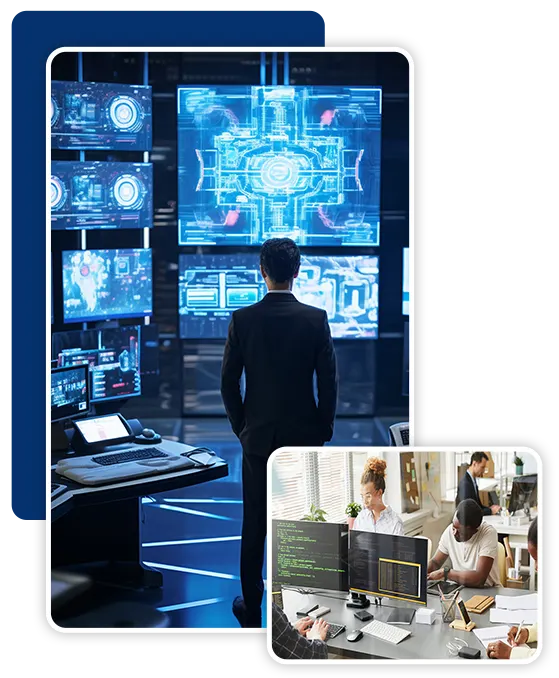Master MSIS information systems
The Master of Information Systems program from the Faculty of Engineering and Information Technology at Vertex University aims to provide students with advanced knowledge and skills to keep pace with rapid developments in the world of technology, enabling them to design, develop and manage modern information systems very efficiently. The program focuses on preparing specialists who are able to analyze and design advanced technical solutions, build strong digital infrastructure, and improve the performance of information systems in institutions in order to support their ability to make strategic decisions based on the latest digital technologies.
The program focuses on developing practical skills for students. They receive integrated training in designing and implementing systems, developing information infrastructure, and creating advanced technology solutions. It also provides students with the ability to build systems that support institutional processes, analyze big data to make accurate decisions, and achieve integration between information systems and modern technology. In addition, the program pays special attention to legal and ethical aspects related to data management, information security, and technology governance. It teaches the latest global standards in cybersecurity, compliance with digital regulations, and ensuring the development of safe and sustainable solutions.
The Master of Information Systems focuses on enabling students to design advanced information systems based on artificial intelligence, cloud computing, and network security, enabling them to develop technical solutions that enhance the efficiency of institutions and support their digital transformation. It also prepares students to understand the technical needs of different institutions, analyze their requirements, and develop innovative solutions that contribute to improving the performance of companies and enhancing their competitiveness in the global digital markets.
The program is taught by a group of academics and practitioners specialized in the fields of programming, data analysis, and information systems management, ensuring the provision of an advanced curriculum that keeps pace with the latest global trends in information technology. The learning environment also provides students with an integrated academic experience based on applied research, interactive education, and the use of the latest tools of big data analysis and digital simulation, which enhances their ability to apply theoretical knowledge in practical environments.
The program offers graduates broad career opportunities in various sectors, including advanced technology companies, financial and industrial institutions, the energy sector, and projects based on digital infrastructure. Graduates can also work in areas such as smart systems analysis and design, software development, database management, cybersecurity, networks, and technical project management, which opens up excellent opportunities at the local and international levels.
Our Vision and Mission
Promising professional opportunities in major technological institutions for an integrated specialization that combines big data analysis, artificial intelligence, cloud computing, and information security.
Our Vision
The Master of Information Systems program at Vertex University should be a leading platform for preparing leaders in digital technology by enabling students to develop smart solutions, analyze strategic data, and effectively contribute to promoting digital infrastructure and innovation at the local and international levels.
Our Mission
Providing an advanced academic program that qualifies specialists to analyze, design and manage contemporary digital systems, based on leading technologies such as artificial intelligence, cloud computing, and Internet of Things. The program aims to build technical competencies capable of leading digital transformation and supporting sustainable development in accordance with the highest ethical and professional standards.
- Providing advanced knowledge in big data analysis, artificial intelligence, cloud computing, and information security to keep pace with technological developments.
- Develop analytical skills to extract valuable insights from big data to support strategic decision-making in organizations.
- Learn to automate processes using artificial intelligence and machine learning to improve work efficiency and reduce errors.
- Master the design of advanced information systems that support enterprise sustainability and promote digital transformation.
- Enhance cybersecurity skills to understand digital threats and develop strategies to protect data and information systems.
- Benefit from a flexible remote learning environment that offers a balance between learning and working with integrated online academic support.
- Master the management of technical projects by learning the best global practices for successfully planning and implementing digital projects.
- Develop communication and collaboration skills with multidisciplinary teams to ensure efficient implementation of technical projects.
- Developing critical and creative thinking skills by dealing with real challenges and developing innovative technical solutions.
- Learn to apply cloud computing techniques to develop flexible infrastructures that support digital enterprises very efficiently.
- Acquire the ability to analyze the requirements of institutions and design technical solutions that suit their changing needs.
- Opening new professional horizons in the fields of programming, data analysis, systems management, and information security in different sectors.
- Improve the efficiency of institutional work through the use of advanced data analysis and artificial intelligence to improve performance.
- Develop the ability to manage digital risks and deal with technological challenges to ensure the continuity of digital systems.
- Preparing students to be leaders in the field of digital transformation and contribute to creating technological solutions that keep pace with the digital future.
Teaching methods and strategy

case studies
The Master of Information Systems program focuses on analyzing actual and virtual case studies that address the challenges facing organizations in data management, digital systems development, and information security. This approach allows students to explore successful systems and others that have experienced operational failures, enabling them to develop innovative technical solutions that enhance system efficiency and improve organizational performance. Artificial intelligence techniques and advanced analysis are also used to provide strategic insights that help improve operational processes and enhance cybersecurity.

Practical projects
The program provides students with a practical experience through advanced technology projects that reflect the real challenges facing digital institutions. These projects include developing advanced digital solutions in the fields of big data analysis, automation of operational processes, management of information systems, and enhancing information security. Cloud computing, Internet of Things, and advanced data analysis techniques are also integrated to design smart technology solutions that contribute to improving enterprise performance. Students are allowed to use the latest digital tools and platforms, helping them explore new technologies and develop solutions that can be implemented in practice.

Teaching strategies
The program is based on an integrated educational approach that combines theoretical foundations and advanced practical applications, ensuring an in-depth understanding of the areas of systems analysis and design, digital data management, and cyber information security. Academic content is delivered through interactive lectures, technical workshops, and analysis of real case studies using the latest digital educational platforms. The program encourages students to think critically and work collectively to discuss recent trends in the field of information systems, enabling them to keep pace with rapid technological innovations.
What can you do with a Master of Information Systems degree?
The Master of Information Systems from Vertex University qualifies its graduates to work in a wide range of specialized technical positions. The most prominent jobs available include:
If you aspire to excel in the world of technology and digital transformation, the Master of Information Systems is your best choice.
- Information systems analyst
- Data engineer
- data scientist
- IT Project Manager
- Cyber security engineer
Be ready to lead in the world of technology, register now and start your journey towards excellence.
- Artificial intelligence and machine learning engineer
- Cloud computing systems developer
- Digital transformation expert
- Advanced software engineer
- Database specialist
Get a consultation
Free now
Do you want to help?
+1 (984) 382-6080
Target group for the Master of Information Systems program

The Master of Information Systems program targets a diverse group of individuals who aspire to develop their skills and enhance their knowledge in the field of management and analysis of digital systems, providing them with broader opportunities in the technical labor market. Target groups include the following:
- Recent graduates with a bachelor's degree in computer science, software engineering, information systems, or related disciplines who seek to build a strong career in data analysis, information systems development, and digital solution management.
- Engineers and specialists working in database management, systems analysis, cloud computing, artificial intelligence, and automation of operational processes, who aspire to develop their technical and administrative skills and enhance their ability to design integrated information systems.
- Individuals wishing to change their career path who seek to move to the field of information systems and acquire the necessary skills to work in systems analysis, develop advanced technology solutions, and manage digital transformation processes in organizations.
- Startup owners who want to design and manage digital systems, develop solutions based on artificial intelligence and data analysis, and take advantage of cloud computing to enhance the sustainability of their projects.
Enhance your professional skills with international certifications
An international certificate that focuses on auditing and controlling information systems. It is essential to evaluate the efficiency of digital systems and risk management in institutions.
An advanced degree in information security, covering the basic aspects of protecting digital systems, and is internationally recognized as proof of cyber expertise.
It gives you advanced skills in designing and operating large networks. It is one of the most important certifications in corporate communication architecture.
It gives you tools to understand patterns and analyze complex data. It is a foundation in developing intelligent information systems based on artificial intelligence.
It focuses on linking business goals to digital systems and supports strategic decision-making based on clear technical policies.
It integrates software development and operations, speeding up the delivery of digital products and improving collaboration between technical teams.
A set of specialized certificates in the design, management, and security of cloud computing environments, which are among the most sought after qualifications in the world.
Awarded by the Project Management Institute (PMI), it is a global standard for project management. The engineer gains the ability to lead technical teams and achieve project goals efficiently and professionally.
Admission Requirements
- Regular admission: the student applying for the graduate program must have a bachelor's degree from a reputable university or from the student's country.
- Conditional admission: The university may offer conditional admission to applicants until all admission requirements are met (terms and conditions for this category apply).
- English language proficiency if the language of instruction in the program is English, with passing the approved language test.
- Conditional admission: The university may offer conditional admission to applicants until all admission requirements are met (terms and conditions for this category apply).
- Submit official documents including the original Bachelor's degree and transcript, along with true copies.
- Fill out the electronic application form through the admission and registration portal at the university.
- Pay the registration fees and tuition fees prescribed in accordance with the university regulations.
- Comply with the university's rules and regulations by signing an official pledge.
Required Documents
- A colored copy of the bachelor's degree issued by the student's country “Ministry of Higher Education”.
- A colored copy of the student's or family ID for matching.
- A colored copy of the student's passport.
- Personal photo (6*4) with a white background.
- Complete the registration data and sign it by the student.
Requirements for Obtaining Master in MSIS information systems Specialization
| Number of Credit Hours Required to Complete the Master Degree | 36 Minimum Required Credit Hours |
|---|---|
| Number of Required Academic Semesters | 4 Academic Semesters |
| Number of Semesters per Year | 3 Semesters |
| Annual Credit Hours | 45 Credit Hour |
| Semester Duration | 8 to 10 weeks |
| Expected Duration to Complete the Program | 1 year and 8 months |
Advantages of this system.
- Complete the master's degree in a short time: the program can be completed in one and a half years instead of two or three years.
- Flexible distribution of materials: materials are distributed throughout the year, allowing continuous learning without long interruptions.
- An intensive schedule: allows you to finish school quickly and is suitable for students who want to enter the labor market as soon as possible.
*This system was designed at Vertex University to enable students to obtain their university degree in a shorter time while maintaining the quality of education and the efficiency of the academic process.

Want to get more information?
Register your details and we will contact you as soon as possible
Frequently Asked Questions about Master MSIS information systems
The college programs provide a comprehensive learning experience that combines a solid theoretical foundation with advanced practical application.
Courses include realistic technical projects, global case studies, digital simulation models, and training on modern professional tools, which qualify students to deal with the challenges of the digital age efficiently and professionally.
Yes, academic programs are designed to comply with international standards of accreditation and quality. The university also seeks the accreditation of prestigious international institutions.
The programs focus on the skills required in global markets such as artificial intelligence, cybersecurity, data analysis, and cloud engineering, which enhances international employment opportunities for our graduates.
The College adopts an interactive e-learning method based on modern technologies, through recorded lectures, live broadcasts, virtual laboratories, and discussion forums.
Evaluation is carried out through standard tests, practical projects, research reports, and presentations in order to measure overall efficiency and not just theoretical memorization.
Yes, the college is keen to build strategic partnerships with technical institutions, startups and research centers, locally and internationally, to provide practical training opportunities, joint projects, or involve students in realistic challenges and digital field assignments (Virtual Internships).
The college adopts a dynamic approach in updating course content through academic and professional committees that include experts from Silicon Valley and international academics.
It also integrates technologies such as virtual reality (VR), cloud computing, and blockchain into student projects and laboratory activities, reflecting the university's commitment to the digital future.
